Key takeaways:
- Experiential learning enhances understanding through active participation and reflection on real experiences.
- Reflective reading fosters personal growth by encouraging deep engagement with texts, leading to new insights and self-awareness.
- Challenges in reflective reading include distractions, confronting uncomfortable emotions, and overcoming self-doubt in interpretations.
- Applying insights from reflective reading can transform personal perspectives and improve relationships with others.
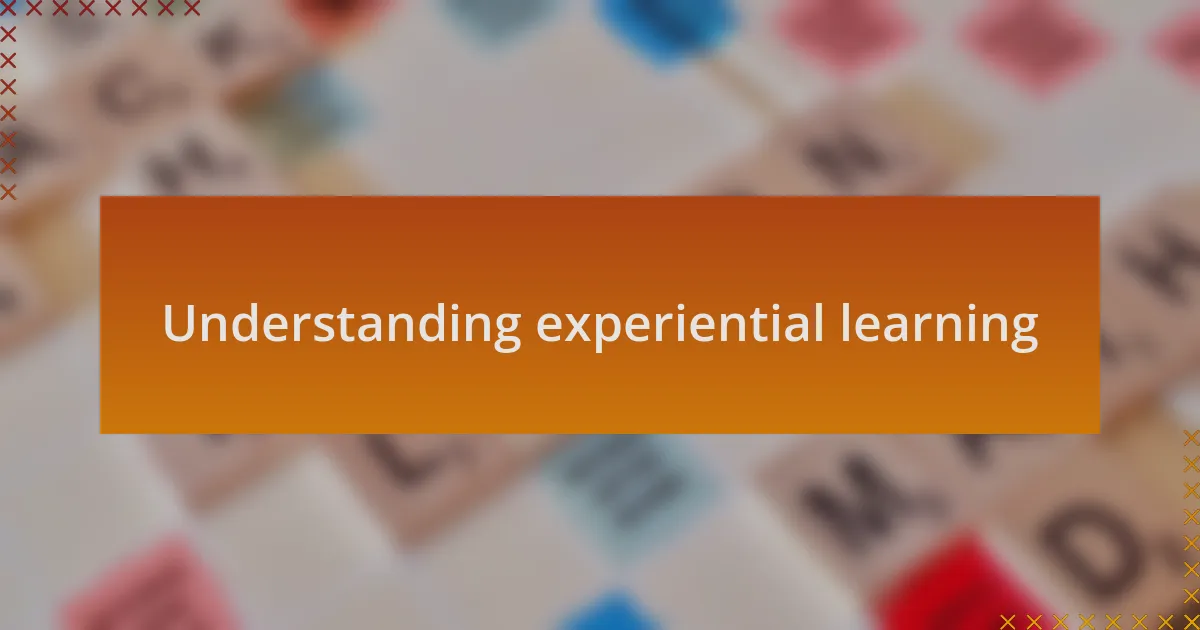
Understanding experiential learning
Experiential learning is about engaging with experiences to deepen understanding and enhance skills. I remember a specific workshop where I had to practice facilitation techniques. It was nerve-wracking at first, but the hands-on approach helped me internalize the concepts in ways that theory alone never could.
Have you ever found yourself in a situation where theory just didn’t connect? I’ve often felt that way, especially in my earlier studies. The shift happened when I started actively participating in group projects, where collaboration transformed my learning process. I found that discussing ideas and reflecting on real scenarios made the concepts resonate more deeply within me.
Reflective practice is a cornerstone of experiential learning. I experienced this firsthand when journaling after a community service project. Taking time to reflect on my actions and emotions allowed me to make sense of the lessons learned, proving that true growth often comes from looking back on our experiences.
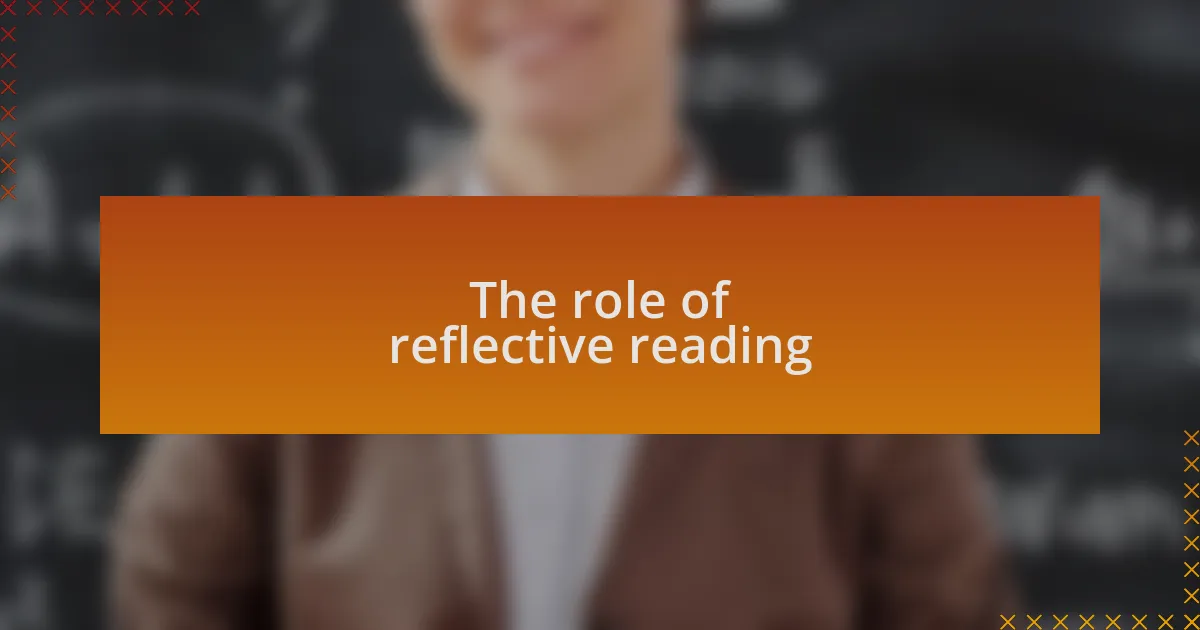
The role of reflective reading
Reflective reading serves as a powerful tool for personal growth and understanding. I remember diving into a book on emotional intelligence, and as I read, I found myself pausing to jot down my thoughts and reactions. It was fascinating how each chapter sparked new realizations about my interactions, revealing blind spots I hadn’t noticed before. This process made me wonder, how often do we truly digest what we read, rather than just skimming for surface-level information?
Engaging with texts reflectively allows for deeper connections to the material, transforming mere reading into a dialogue between the reader and the author. I found that when I questioned the motives behind characters’ actions in novels, I not only deepened my comprehension but also gained insights into my own behavioral patterns. This connection often leaves me pondering how the stories reflect aspects of my life.
Moreover, reflective reading encourages critical thinking, enabling us to evaluate our beliefs and assumptions. On a particularly rainy afternoon, I revisited a thought-provoking article on societal norms. With each paragraph, I juxtaposed the author’s views against my own experiences. That practice not only enriched my understanding but also prompted me to reconsider my viewpoints. I realized then that every reflective reading session is an opportunity to not only learn but to grow—all it takes is the willingness to engage with the words on the page.
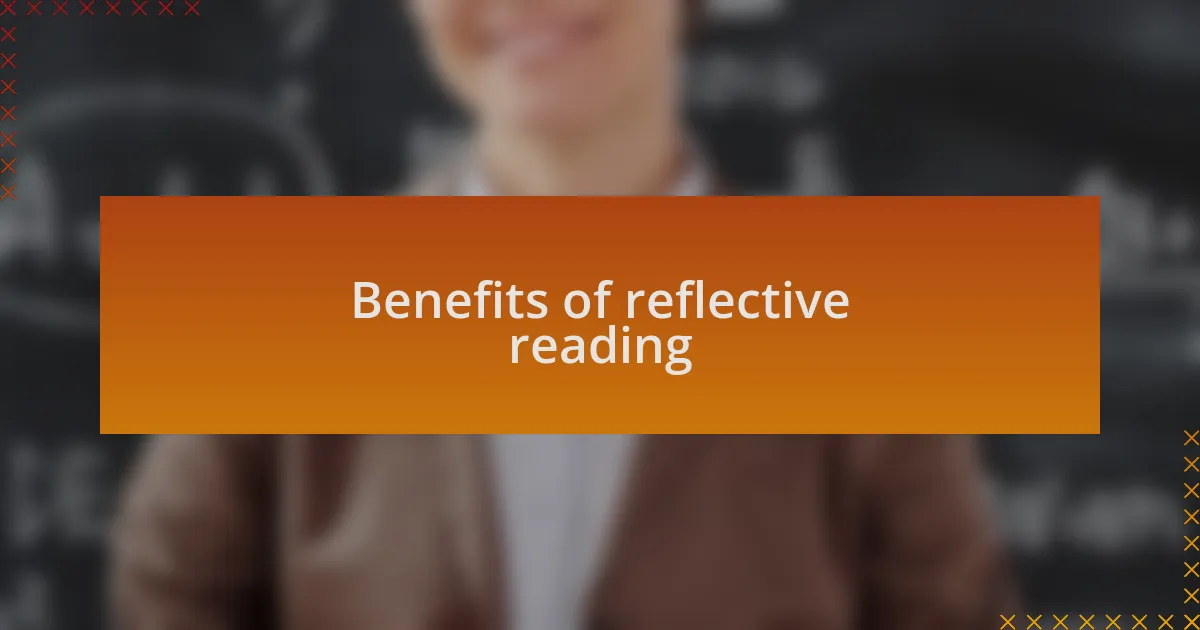
Benefits of reflective reading
Reflective reading offers a unique blend of introspection and learning that can profoundly change our perspectives. For instance, while reading a memoir last summer, I caught myself underlining passages that resonated with my own life experiences. Each highlighted line became a reminder of my journey, prompting me to ask, “How did they navigate their challenges?” This simple act of marking the text allowed me to create connections—both with the author and within myself.
In my experience, reflective reading cultivates empathy as I step into the shoes of various characters or real-life figures. I vividly recall finishing a gripping novel where the protagonist faced extraordinary challenges. As I reflected on their resilience, I felt a surge of motivation within me, questioning how I might approach my own obstacles. This moment made me realize that the emotional landscape of a story can often mirror our struggles, deepening our understanding of ourselves and others.
Furthermore, one of the most significant benefits of reflective reading is its ability to enhance self-awareness. There were times when I found myself reading poetry, and each verse seemed to echo thoughts I had buried deep down. It struck me how words on a page could trigger such profound introspection, leading me to ponder, “What does this really say about my feelings?” This practice not only strengthens our connection to the text but also unpacks layers of our psyche, making us more attuned to our beliefs and emotions.
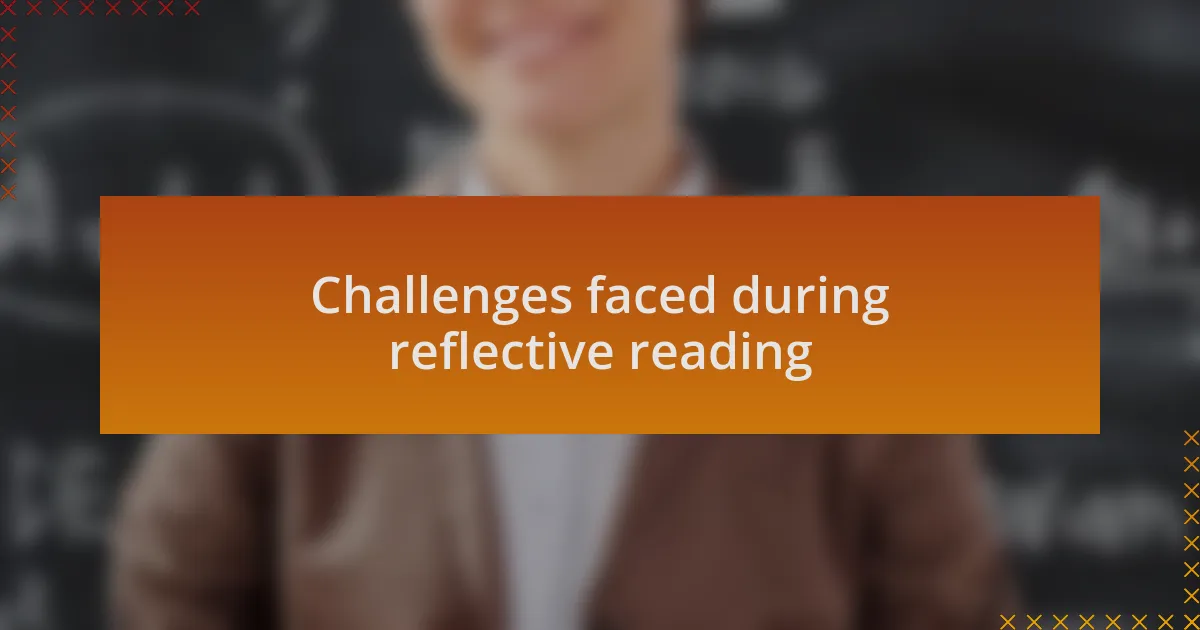
Challenges faced during reflective reading
Engaging in reflective reading comes with its fair share of challenges. One hurdle I often face is the noise of distractions around me. There have been moments when I sat down with a captivating book, only to find my mind wandering to my to-do list or the commotion of daily life. How can I expect to dive deep into my thoughts when my focus keeps slipping away? It takes real determination to create a quiet space, both physically and mentally.
Another challenge lies in confronting uncomfortable emotions. I remember reading a powerful essay that brought up feelings I had tucked away for years. Initially, I resisted reflecting on those parts, feeling vulnerable and exposed. It’s tough to confront our past when the truth stings. Yet, those very moments often reveal the most profound insights. Isn’t it strange how facing discomfort can lead to growth?
Lastly, I sometimes grapple with self-doubt about my interpretations of the text. During one reflective session, I struggled with an ambiguous poem that made me question my understanding. “Am I missing something essential?” I wondered. This doubt can be paralyzing but it can also spark deeper inquiry. It challenges me to dig deeper and consider multiple perspectives, reminding me that the journey of understanding is often just as valuable as the conclusions we reach.
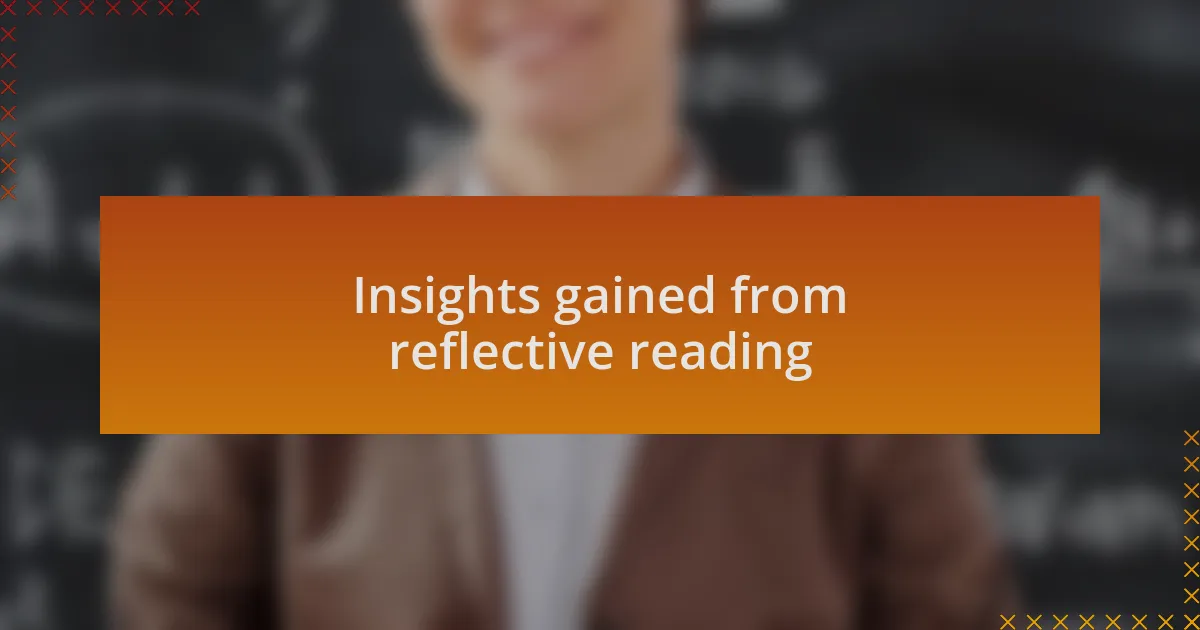
Insights gained from reflective reading
Reflective reading has gifted me with moments of clarity that often surprise me. There was a time when I dissected a biography of a historical figure I admired, only to find parallels with my own experiences. It struck me how their struggles mirrored my own, prompting me to reconsider my challenges in a new light. Have you ever caught yourself recognizing your own story in someone else’s narrative? It can be incredibly enlightening.
Through this process, I’ve learned the importance of empathy—not just for others but for myself, too. While reflecting on a sensitive topic in a novel, I found myself feeling the pain of the characters deeply, which helped me confront my own fears. It was as if the pages were a mirror, reflecting both their struggles and my own shortcomings. Why do we sometimes shy away from such emotional truths? In facing them, I’ve discovered resilience and a newfound strength.
Moreover, reflective reading has enriched my analytical skills. One day, while engaged with a challenging philosophical essay, I found myself wrestling with complex concepts that felt daunting at first. With time, I learned to break down these ideas, allowing me to make connections that enriched my own worldview. It’s fascinating how the effort to understand can lead to unexpected insights. How often do we miss the deeper meanings hidden within words when we skim through them? Taking the time to reflect not only enhances comprehension but transforms reading into a powerful tool for personal growth.
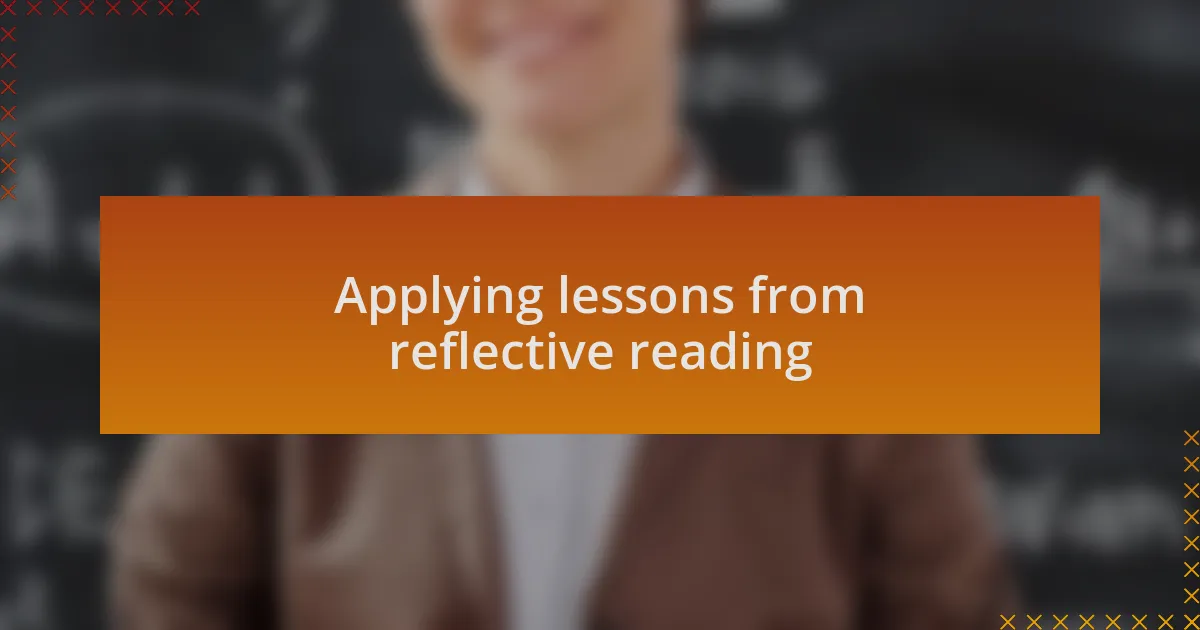
Applying lessons from reflective reading
Applying lessons from reflective reading has enabled me to tackle real-life challenges with a fresh perspective. For instance, during a week spent with a gripping novel about overcoming adversity, I drew parallels between the protagonist’s journey and my own struggles at work. Have you ever found a character’s determination inspiring enough to spark a change in your own behavior? That experience pushed me to embrace my difficulties rather than shy away from them.
I’ve also noticed that reflective reading helps me cultivate a more profound understanding of others. After reading a memoir from an entirely different cultural background, I felt an emotional connection that prompted me to engage in conversations with friends about their experiences. It made me wonder, how often do we pass up opportunities to learn from those around us? By actively listening and relating those readings to my life, I’ve become more open-minded and empathetic.
Additionally, I apply lessons learned from reflective reading in my daily interactions. One day, I stumbled upon a passage about forgiveness in a self-help book that resonated with me deeply. It inspired me to approach a long-standing conflict with a friend more compassionately. Isn’t it amazing how words on a page can ignite a desire for resolution? This transformation has enriched my relationships, highlighting how reflective reading can lead to meaningful change in how I navigate the world.